And Other Stories
And Other Stories
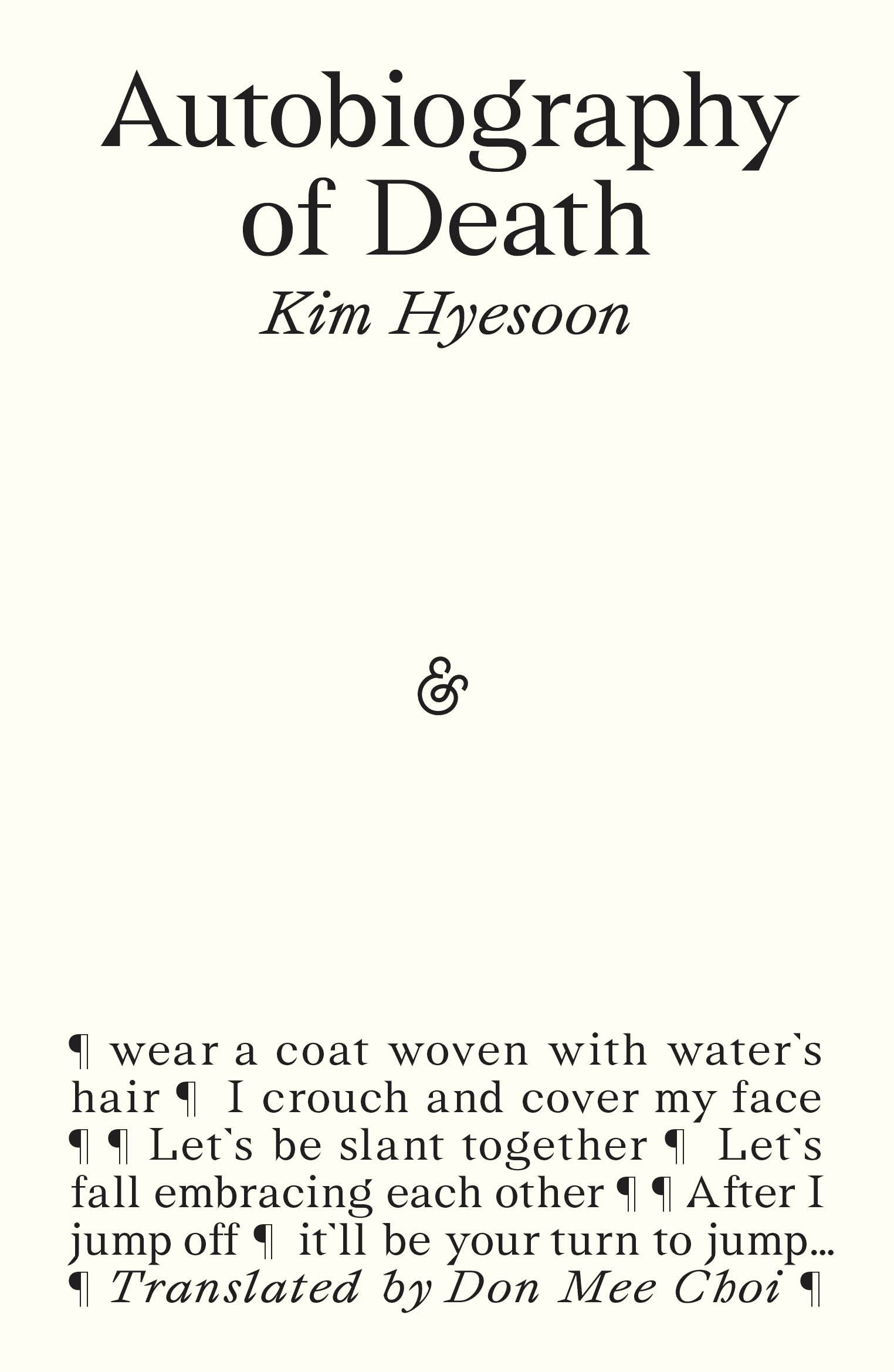
Autobiography of Death
‘I thought to myself that I needed to sing death, perform a rite for death, write death, then bid farewell to it. The way to send death away was to sing with my own death all the death in the sky and on the ground.’
The title section of Kim Hyesoon’s visceral Autobiography of Death consists of forty-nine poems, each poem representing a single day during which the spirit roams after death before it enters the cycle of reincarnation. The poems not only give voice to those who met unjust deaths during Korea’s violent contemporary history, but also unveil what Kim calls ‘the structure of death, that we remain living in’. Autobiography of Death at once re-enacts trauma and narrates death – how we die and how we survive within this cyclical structure. In this sea of mirrors, the plural ‘you’ speaks as a body of multitudes that has been beaten, bombed, and buried many times over by history. The volume concludes on the other side of the mirror with ‘Face of Rhythm’, a poem about individual pain, illness, and meditation.
Winner of the 2019 International Griffin Poetry Prize
Winner of the 2019 Lucien Stryk Asian Translation Prize
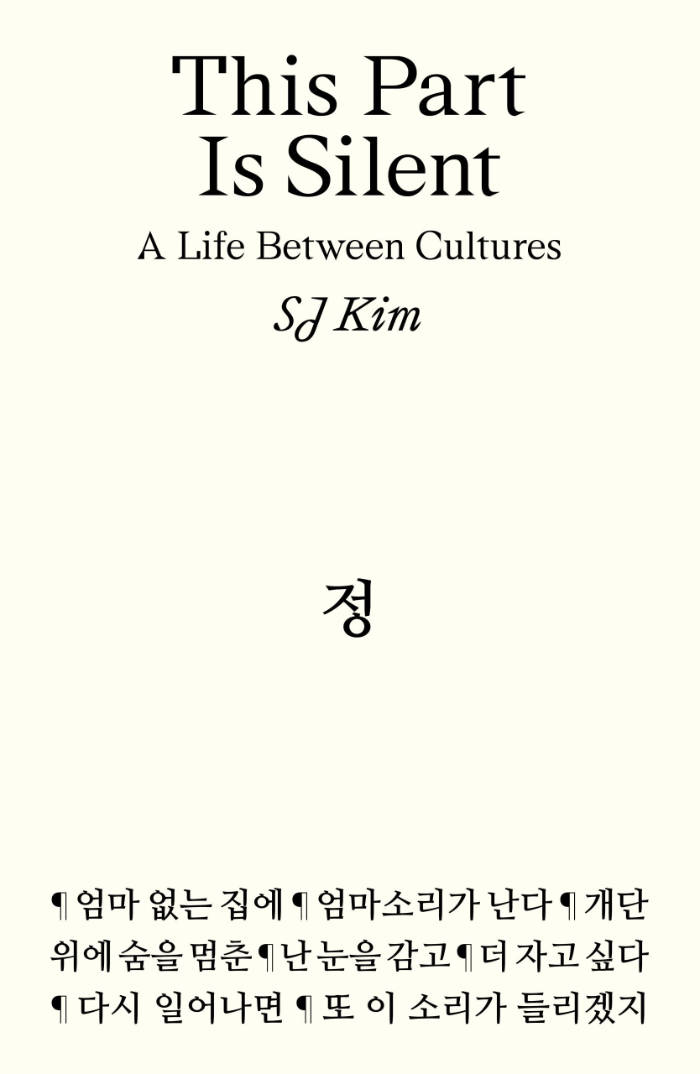
This Part Is Silent: A Life Between Cultures
Born in Korea, raised in the American South, and trying her best to survive British academia, SJ Kim probes her experiences as a writer, scholar, and daughter to confront the silences she finds in the world. With curiosity and sensitivity, she writes letters to the institutions that simultaneously support and fail her, intimate accounts of immigration, and interrogations of rising anti-Black and anti-Asian racism. She considers the silences between generations―especially within the Asian diaspora in the West―as she finds her way back to her own family during the pandemic lockdown. Embracing the possibilities and impossibilities of language, Kim rejoices in the similes of Korean, her mother tongue, and draws inspiration from K-dramas and writers who sustain her, including Yusef Komunyakaa, Don Mee Choi, Toni Morrison, and Theresa Hak Kyung Cha.
Longlisted for the 2025 Andrew Carnegie Medal for Excellence in Nonfiction.
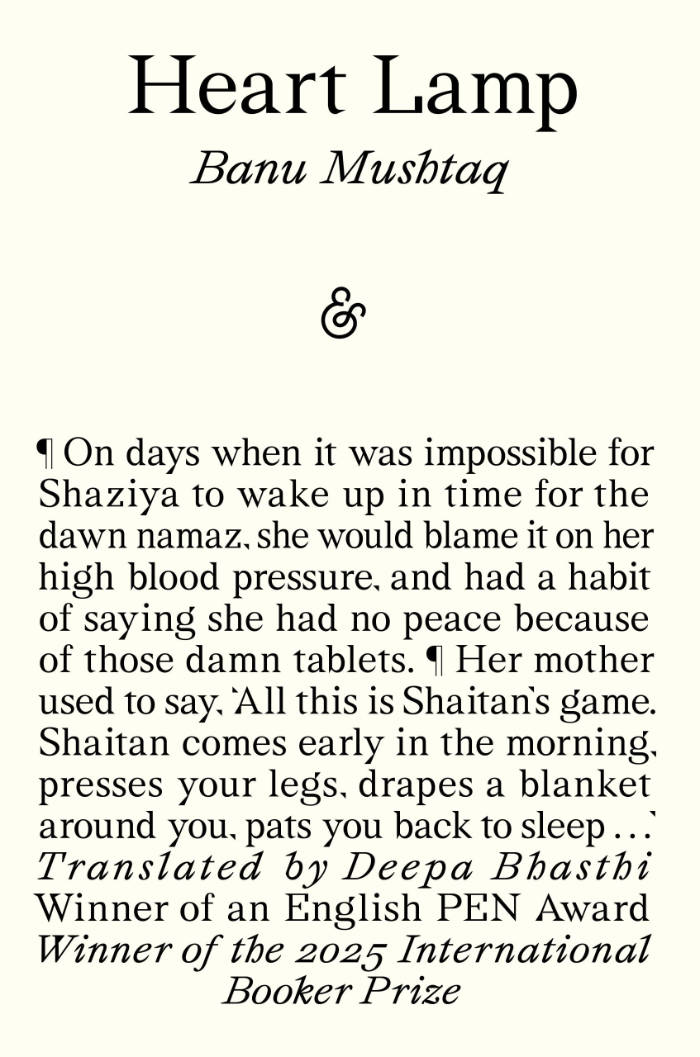
Heart Lamp
In the twelve stories of Heart Lamp, Banu Mushtaq exquisitely captures the everyday lives of women and girls in Muslim communities in southern India. Published originally in the Kannada language between 1990 and 2023, praised for their dry and gentle humour, these portraits of family and community tensions testify to Mushtaq’s years as a journalist and lawyer, in which she tirelessly championed women’s rights and protested all forms of caste and religious oppression. Written in a style at once witty, vivid, colloquial, moving and excoriating, it’s in her characters – the sparky children, the audacious grandmothers, the buffoonish maulvis and thug brothers, the oft-hapless husbands, and the mothers above all, surviving their feelings at great cost – that Mushtaq emerges as an astonishing writer and observer of human nature, building disconcerting emotional heights out of a rich spoken style. Her opus has garnered both censure from conservative quarters as well India’s most prestigious literary awards; this is a collection sure to be read for years to come.
Winner of the 2025 International Booker Prize.
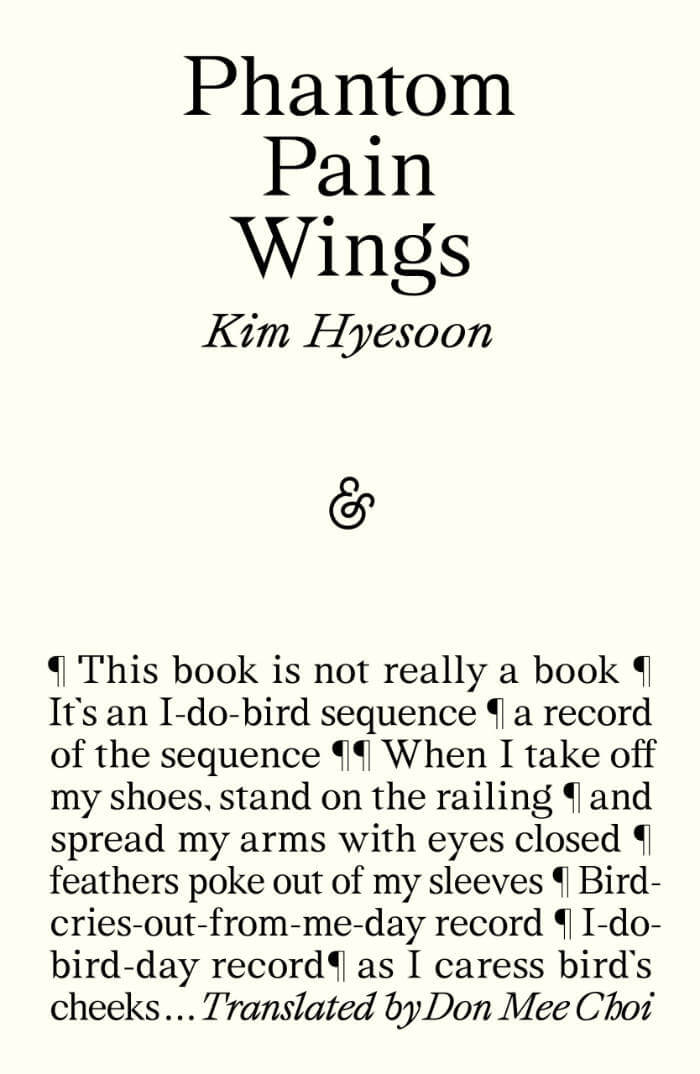
Phantom Pain Wings
Kim Hyesoon is an iconic figure in feminist poetry. In her new collection, she depicts the memory of war trauma and the collective grief of parting through what she calls an ‘I-do-bird-sequence’. Through intensely rhythmic lines marked by visual puns and words that crash together and then fly away as one, Kim mixes traditional folklore and mythology with contemporary psychodramatic realities as she taps into a cremation ceremony, the legacies of Rimbaud and Yi Sang, a film by Agnès Varda, Francis Bacon’s portrait of Pope Innocent X, cyclones, a princess trapped in a hospital, and more. A simultaneity of voices and identities rises and falls, existing and exiting on their delayed wings of pain.
Winner of the 2024 National Book Critics Circle Award for Poetry (USA)
2024 Poetry Book Society Translation Choice
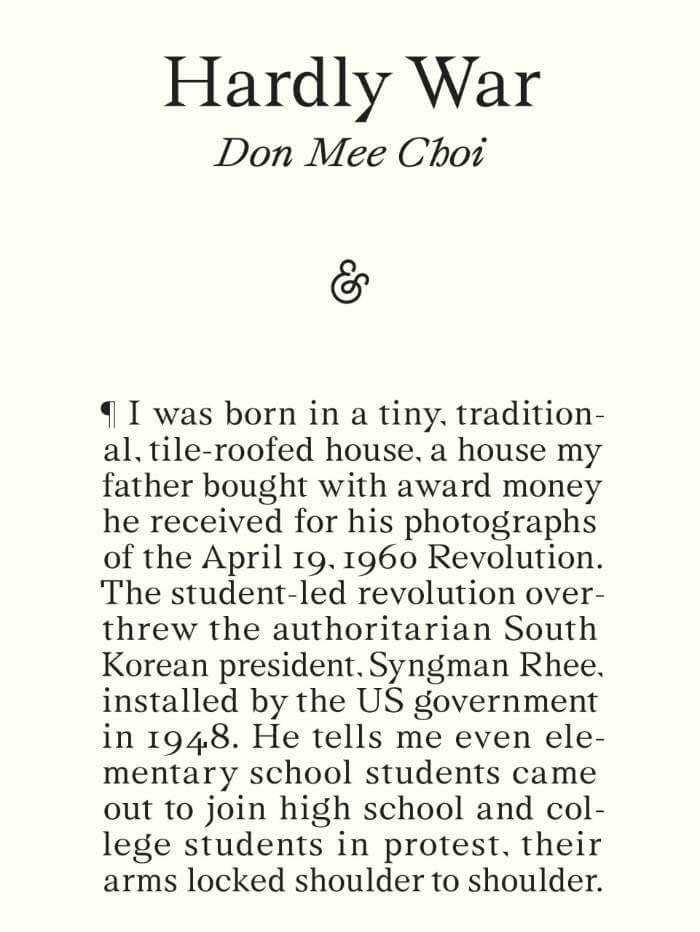
Hardly War
Hardly War, first published in the USA in 2016 and finally published in the UK in 2025, splices the personal and political to dizzying effect in a poetry fluid with forms and genres including reportage, memoir, opera libretto, archival photos and drawings. Using artefacts from Choi’s father, a professional documentary photographer during the Korean and Vietnam wars, she explores her paternal relationship and heritage. Here poetry and geopolitics are inseparable twin sisters, conjoined to the belly of a warring empire.
Choi’s KOR-US Trilogy (Hardly War and the subsequent DMZ Colony and Mirror Nation) brings us a new poetic language to learn. Suggestive and subtle in its connections and allusions, there is an exhilarating freedom in its playful form, all while looking straight at the brutality of colonialism and dictatorship.

Mammoth
Mammoth’s protagonist is a disenchanted young lesbian. She’s inexperienced, irritated by life, eager to gestate, and determined to strip everything else down to essentials. She seduces men at random, swaps her urban habitat for an isolated farmhouse, befriends a shepherd, nurses lambs, battles stray cats, waits tables, cleans house, and dabbles in sex work – all in pursuit of life in the raw. This small bomb of a novel, not remotely pastoral, builds to a howling crescendo of social despair, leaving us at the mercy of Eva Baltasar’s wild voice.
Translated by Julia Sanches.
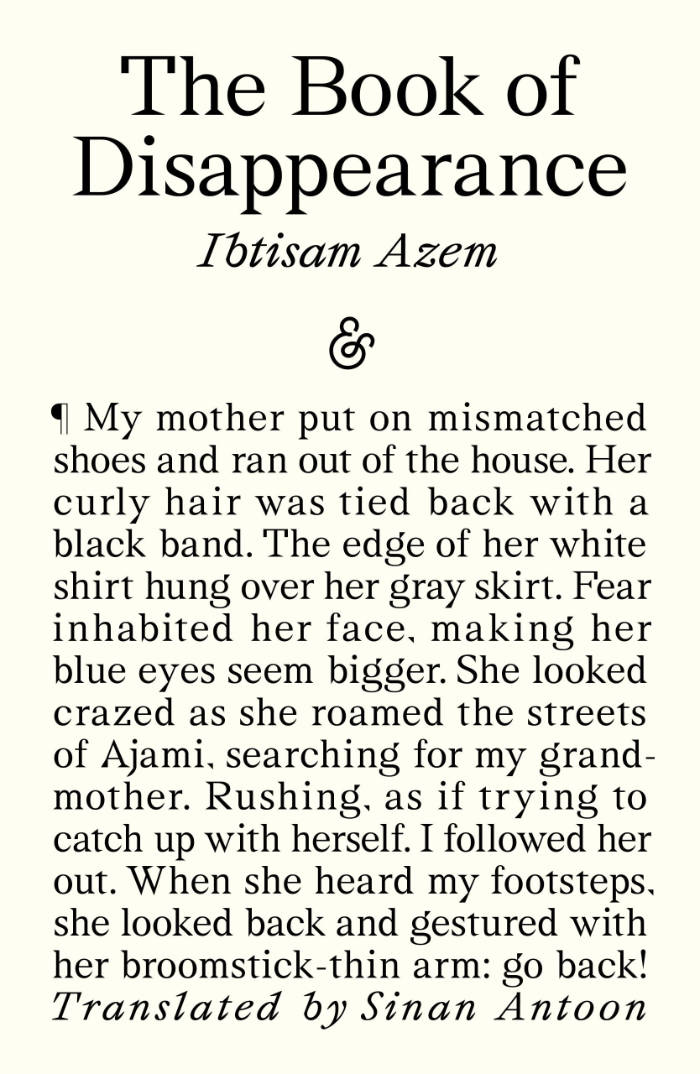
The Book of Disappearance
Alaa is haunted by his grandmother’s memories of being displaced from Jaffa and becoming a refugee in her homeland after the Nakba. Ariel, Alaa’s neighbour and friend, is a liberal Zionist, critical of the military occupation of the West Bank and Gaza yet faithful to the project of Israel. When he wakes up one morning to find that all Palestinians have suddenly vanished, Ariel begins searching for clues to the secret of their collective disappearance.
That search, and Ariel’s reactions to it, intimately reveal the fissures at the heart of the Palestinian question. Between the stories of Alaa and Ariel are the people of Jaffa and Tel Aviv – café patrons, radio commentators, flower-cutters – against whose ordinary lives these fissures and questions play out.
Critically acclaimed in Arabic, spare yet evocative, intensely intelligent in its interplay of perspectives, The Book of Disappearance is an unforgettable glimpse into contemporary Palestine as it grapples with both the memory of loss and the loss of memory.

Split Tooth (Uk edition)
Fact can be as strange as fiction. It can also be as dark, as violent, as rapturous. In the end, there may be no difference between them. An Inuk girl grows up in Nunavut, Canada, in the 1970s. She knows joy, and friendship, and parents’ love. She knows boredom, and listlessness, and bullying. She knows the tedium of the everyday world, and the raw, amoral power of the ice and sky, the seductive energy of the animal world. She knows the ravages of alcohol, and violence at the hands of those she should be able to trust. She sees the spirits that surround her, and the immense power that dwarfs all of us.
When she becomes pregnant, she must navigate all this.
In this acclaimed debut novel – haunting, brooding, exhilarating, and tender all at once – Tanya Tagaq explores the grittiest features of a small Arctic town and the electrifying proximity of the worlds of animals and of myth.
Winner of the 2019 Indigenous Voices Award for Published Prose in English.
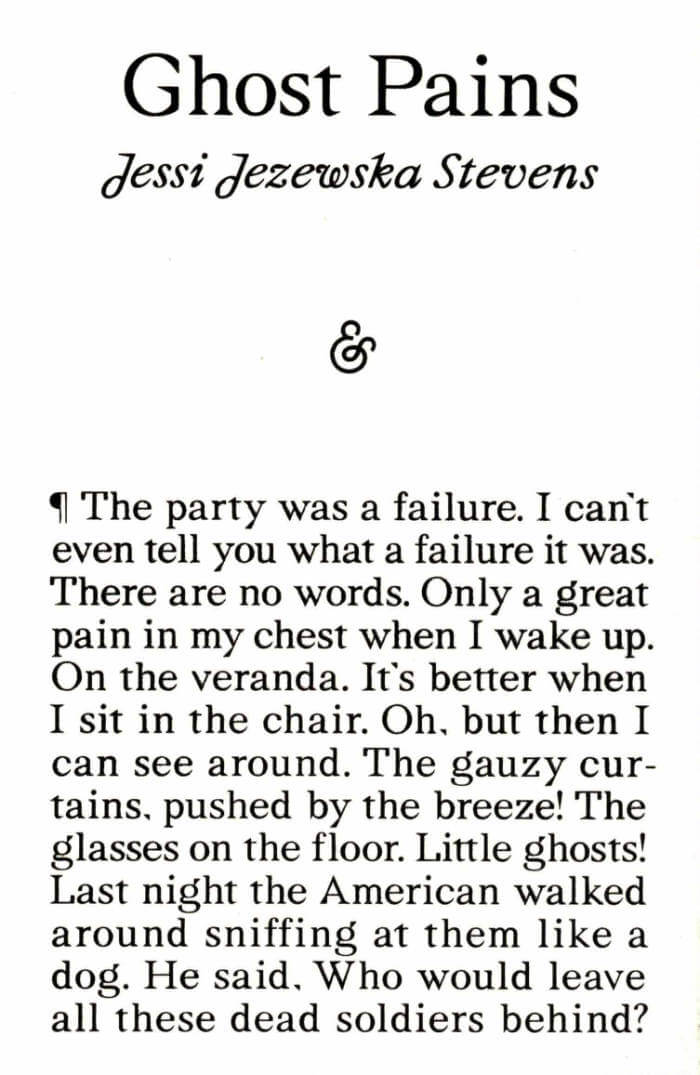
Ghost Pains
With her novel The Visitors, Jessi Jezewska Stevens has proven herself as our preeminent purveyor of comical, techno-millenarian unease. Now, with this first collection of her acclaimed short fiction – originally appearing in such venues as The Paris Review and Harper’s – some of her very best work is at last readily available to readers.
Stevens’s women throw disastrous parties in the post-party era, flirt through landscapes of terror and war, and find themselves unrecognisable after waking up with old flames in new cities. They navigate the labyrinths of history, love, and ethics in a fractured American present, seeing first-hand how history influences the ways in which we care for – or neglect – one another.
With each story exemplifying Stevens’s ability to examine the big questions through the microscope of a shambolic human perspective, Ghost Pains is a triumphant statement of purpose from one of our greatest young writer-thinkers.

Boulder
Working as a cook on a merchant ship, a woman comes to know and love Samsa, a woman who gives her the nickname ‘Boulder’. When Samsa gets a job in Reykjavik and the couple decides to move there together, Samsa decides that she wants to have a child. She is already forty and can’t bear to let the opportunity pass her by. Boulder is less enthused, but doesn’t know how to say no – and so finds herself dragged along on a journey that feels as thankless as it is alien.
With motherhood changing Samsa into a stranger, Boulder must decide where her priorities lie, and whether her yearning for freedom can truly trump her yearning for love.
Once again, Eva Baltasar demonstrates her pre-eminence as a chronicler of queer voices navigating a hostile world – and in prose as brittle and beautiful as an ancient saga.
Shortlisted for the 2023 International Booker Prize.

Your Love Is Not Good
At an otherwise forgettable party in Los Angeles, a queer Korean American painter spots a woman who instantly controls the room: gorgeous and distant and utterly white, the centre of everyone’s attention. Haunted into adulthood by her Korean father’s abandonment of his family, as well as the spectre of her beguiling, abusive white mother, the painter finds herself caught in a perfect trap. She wants Hanne, or wants to be her, or to sully her, or destroy her, or consume her, or some confusion of all the above. Since she’s an artist, she will use art to get closer to Hanne, beginning a series of paintings with her new muse as model. As for Hanne, what does she want? Her whiteness seems sometimes as cruel as a new sheet of paper.
When the paintings of Hanne become a hit, resulting in the artist’s first sold-out show, she resolves to bring her new muse with her to Berlin, to continue their work, and her seduction. But, just when the painter is on the verge of her long sought-after breakthrough, a petition started by a Black performance artist begins making the rounds in the art community, calling for the boycott of major museums and art galleries for their imperialist and racist practices.
Torn between her desire to support the petition, to be a success, and to possess Hanne, the painter and her reality become more unstable and disorienting, unwilling to cut loose any one of her warring ambitions, yet unable to accommodate them all. Is it any wonder so many artists self-destruct so spectacularly? Is it perhaps just a bit exciting to think she could too?
Your Love Is Not Good stuffs queer explosive into the cracks between identity and aspiration, between desire and art, and revels in the raining debris.
Johanna Hedva is a Korean American writer, artist, and
musician who was raised in Los Angeles by a family of witches, and now lives in LA and Berlin. Hedva is the author of the essay 'Sick Woman Theory', originally published in 2016, which has now been translated into ten languages. Hedva is also the author of the novel On Hell, which was one of Dennis Cooper's favourite books of 2018, and the nonfiction collection Minerva the Miscarriage of the Brain. Their albums are The Sun and the Moon and Black Moon Lilith in Pisces in the 4th House.

Tripticks
First published in 1972, Ann Quin's fourth and final novel was a radical break from the introspective style she had developed in Three and Passages: a declaration of independence from all expectations.
Brashly experimental, ribald, and hilarious, Tripticks maps new territories for the novel—aspiring to a form of pop art via the drawings of the artist Carol Annand and anticipating the genre-busting work of Kathy Acker through collage and gory satire.
Splattering its pages with the story of a man being chased across a nightmarish America by his "first X-wife," and her "schoolboy gigolo," Tripticks was ground zero for the collision of punk energy with high style.
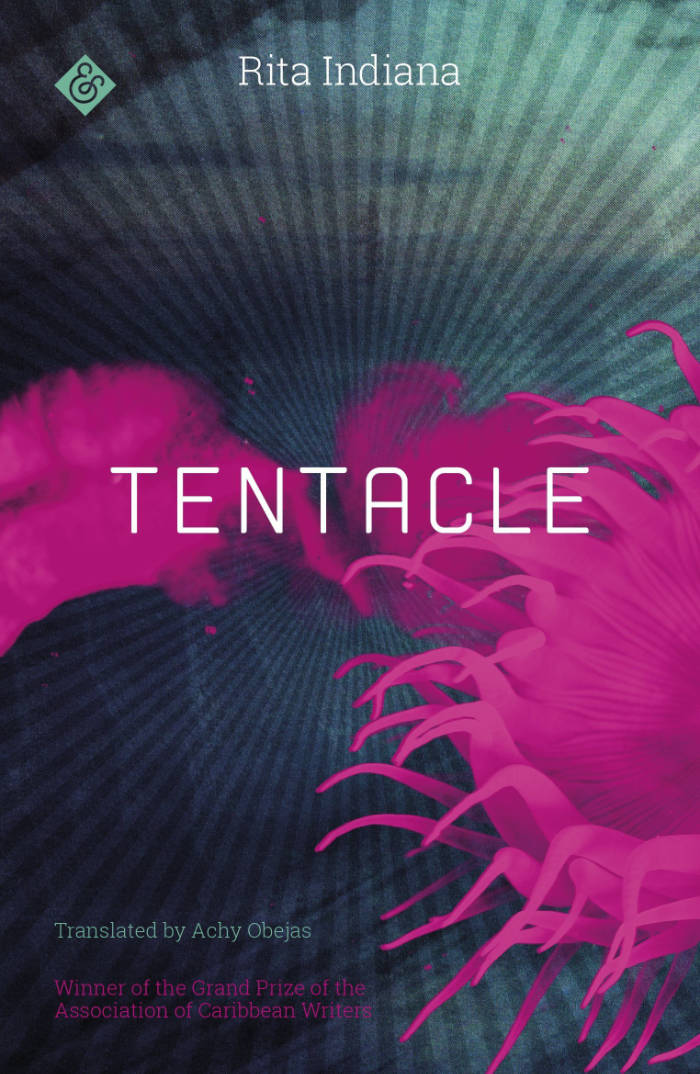
Tentacle
Plucked from her life on the streets of post-apocalyptic Santo Domingo, young maid Acilde Figueroa finds herself at the heart of a Santería prophecy: only she can travel back in time and save the ocean – and humanity – from disaster. But first she must become the man she always was – with the help of a sacred anemone. Tentacle is an electric novel with a big appetite and a brave vision, plunging headfirst into questions of climate change, technology, Yoruba ritual, queer politics, poverty, sex, colonialism and contemporary art. Bursting with punk energy and lyricism, it’s a restless, addictive trip: The Tempest meets the telenovela.
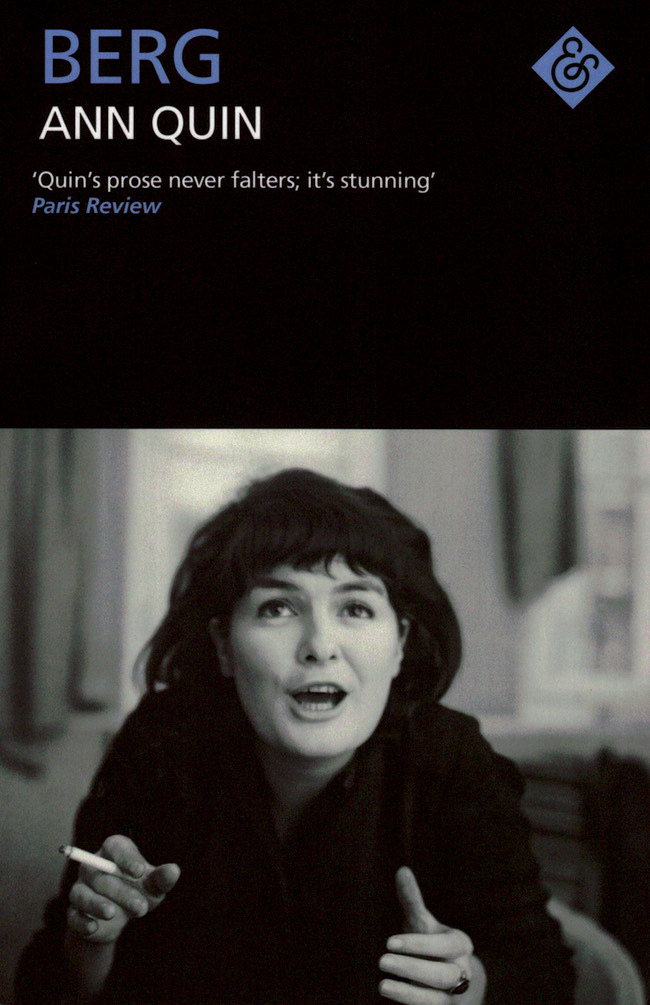
Berg
"A man called Berg, who changed his name to Greb, came to a seaside town intending to kill his father. . ."
So begins Ann Quin's madcap frolic with sinister undertones, a debut "so staggeringly superior to most you'll never forget it" (The Guardian). Alistair Berg hears where his father, who has been absent from his life since his infancy, is living. Without revealing his identity, Berg takes a room next to the one where his father and father's mistress are lodging and he starts to plot his father's elimination. Seduction and violence follow, though not quite as Berg intends, with Quin lending the proceedings a delightful absurdist humor.
Anarchic, heady, dark, Berg is Quin's masterpiece, a classic of post-war avant-garde British writing, and now finally back in print after much demand.
Ann Quin (b. 1936) was a British writer from Brighton. She was prominent amongst a group of British experimental writers of the 1960s, which included B.S. Johnson. Prior to her death in 1973, she published four novels: Berg (1964), Three (1966), Passages (1969), and Tripticks (1972). A collection of short stories and fragments, The Unmapped Country (edited by Jennifer Hodgson) was published by And Other Stories in 2018.

Three
S has disappeared from Ruth and Leonard's home in Brighton. Suicide is suspected. The couple, who had been spying on their young lodger since before the trouble, begin to pour over her diary, her audio recordings and her movies - only to discover that she had been spying on them with even greater intensity. As this disturbing, highly charged act of reciprocal voyeurism comes to light, and as the couple's fascination with S comes to dominate their already flawed marriage, what emerges is an unnerving and absorbing portrait of the taboos, emotional and sexual, that broke behind the closed doors of 1950s British life.
Ann Quin (1936-1973) was a working-class writer from Brighton, England. She was at the forefront of British experimentalism in the 1960s along with BS Johnson and Alan Burns. Prior to her death in 1973, she published four novels: Berg(1964), Three (1966), Passages (1969) and Tripticks (1972). A collection of short stories and fragments, The Unmapped Country (edited by Jennifer Hodgson), was published by And Other Stories in 2018. Quin's novel Berg was republished by And Other Stories in 2019, followed by Three in 2020.

Passages
A book of voices, landscapes and seasons, Ann Quin's newly republished novel mirrors the multiplicity of meanings of the very word 'passage', of music, of time, and of life itself. A woman, accompanied by her lover, searches for her lost brother, who may have been a revolutionary, and who may have been tortured, imprisoned or killed. Roving through a Mediterranean landscape, they live out their entangled existences, reluctant to give up, afraid of the outcome.
Reflecting the schizophrenia of its characters, the novel splits into alternating passages, switching between the sister and her lover's perspective. The lover's passages are also fractured, taking the form of a diary with notes alongside the entries. An intricate system of repetition and relation builds across the passages. 'All seasons passed through before the pattern formed, collected in parts.'
Ann Quin (1936-1973) was a working-class writer from Brighton, England. She was at the forefront of British experimentalism in the 1960s along with BS Johnson and Alan Burns. Prior to her death in 1973, she published four novels: Berg(1964), Three (1966), Passages (1969) and Tripticks (1972). A collection of short stories and fragments, The Unmapped Country (edited by Jennifer Hodgson), was published by And Other Stories to great acclaim in 2018. Quin's novel Berg was republished by And Other Stories in 2019, followed by Three in 2020.